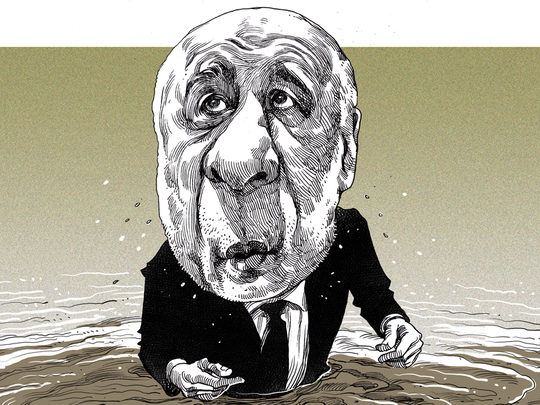
Iraqi Prime Minister Haider Al Abadi is struggling to rebuild any authority over his coalition government after two years of inactivity that have sparked a wave of outrage over its lack of achievement. The attack has been mainly sponsored by religious politician Moqtada Al Sadr, who comes from an influential Shiite family who raised a substantial and successful militia called the Mahdi Army after the 2003 invasion of Iraq by the United States, but has now reinvented himself as a politician and champion of reform.
Waiting in the wings and hoping to profit from any confusion is Nouri Al Maliki — who was Iraq’s prime minister from 2006 to 2014, when he was asked to hand over charge to Al Abadi, following a general election that he only had just lost. Al Maliki sees Al Abadi’s problems as a wonderful opportunity to regain power, but Al Maliki’s regime was tainted by his open support of a Shiite agenda in a country that desperately needs to have a government that can appeal across the Shiite-Sunni divide to all Iraqis.
Al Abadi and his much more inclusive vision offered a welcome contrast to the openly sectarian Al Maliki. But after his appointment in 2014, Al Abadi has failed to follow through on that vision, which has not only frustrated his friends, but this failure to become more inclusive also created a serious new problem for the Iraqi state as it battles Daesh (the self-proclaimed Islamic State of Iraq and the Levant), which still holds most of the west of the country and Mosul.
The military counter-attack has been disgracefully slow and Al Abadi has failed to create the necessary powerful political or social appeal to attract the Sunni population currently under Daesh rule. One of the reasons Daesh was able to capture large swaths of land was Al Maliki’s open bias towards Shiites. If there is to be a long-term solution in the west of Iraq, Al Abadi needs to be able to reach out more successfully to the Sunnis of the region and convince them to recommit their loyalty to the Iraqi state.
Combatting corruption
Nonetheless, inclusivity towards Sunnis is not Al Sadr’s problem with Al Abadi. The fierce cleric-turned-politician wants to force the government to do something about its corruption and failure to provide much effective governance.
Late last year, Al Abadi faced serious criticism from the nation’s highest Shiite cleric, Grand Ayatollah Ali Al Sistani, who said that the government had done little to combat corruption. This forced Al Abadi to seek changes that would challenge the established system under which ministries are given to coalition supporters and are then treated as sources of private power and revenue, which destroys any hope of effective government and any concept of public service.
But the growing storm forced Al Abadi to announce in February that he wanted to replace many of the politically-appointed ministers with technocrats, so as to weaken the current system that distributes ministries along ethnic and sectarian lines, creating patronage networks blamed for enabling corruption. Since March, Al Abadi’s government has been frozen as he has struggled to win consensus for the various combinations of new ministers he has presented to President Fouad Masum and Parliament Speaker Saleem Al Jubouri. Two weeks ago, he finally managed to get parliamentary approval for the replacement of a few ministries before the full range of changes were stymied by parliamentary disorder and the storming of the Green Zone and parliament buildings by protesters.
The current standoff may continue for some time as the existing parliamentary parties and their shifting coalitions sort themselves out and seek what immediate advantage they can find from the current crisis.
This political stasis has put Moqtada Al Sadr back into the centre of Iraqi politics after some years away from the scene.
Al Sadr comes from a leading family of Shiite clerics, and his father was Grand Ayatollah Mohammad Sadiq Al Sadr, who was killed under former Iraqi president Saddam Hussain’s rule. In the immediate aftermath of the America-led invasion, Al Sadr used his family’s position to raise the Mahdi Army, a 60,000-strong militia that was able to successfully challenge the occupying American and Iraqi government forces.
The Mahdi Army was once the most active and feared armed Shiite group in Iraq and was blamed by Washington for death-squad killings of thousands of Sunnis. However, in August 2008, Al Sadr suspended the Mahdi Army after major US and Iraqi assaults on its strongholds in Baghdad and southern Iraq. He went into religious seclusion to study to further his progression in the Shiite hierarchy.
Al Sadr’s re-emergence in Iraqi national politics could go in all sorts of ways as he uses his mass appeal to motivate his followers. He may choose to remain outside the structure and maintain his followers as a protest movement to be used to favour his allies in power, or he may take a more direct hand. Either way, he is set to wield more direct political influence than he has for years.










